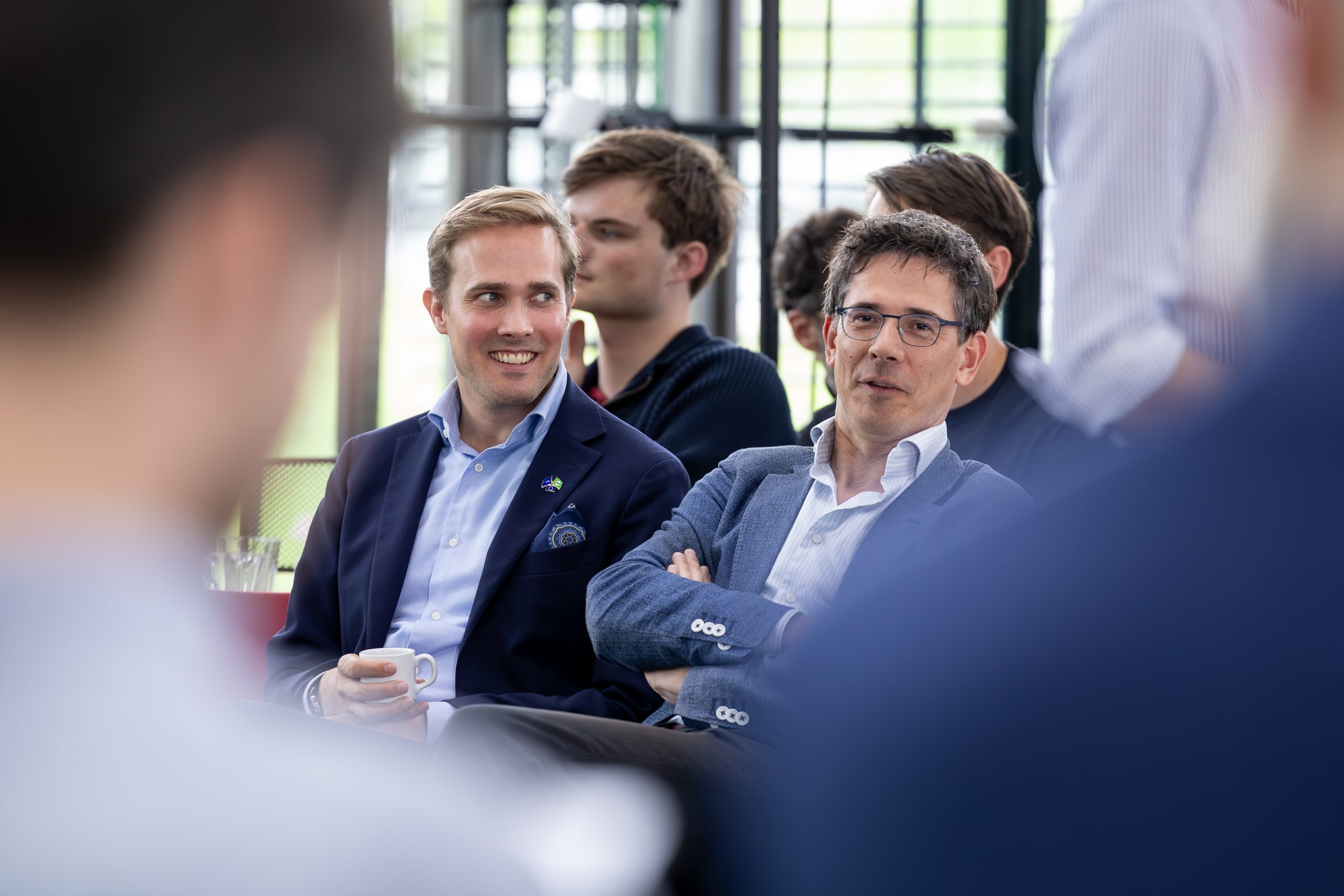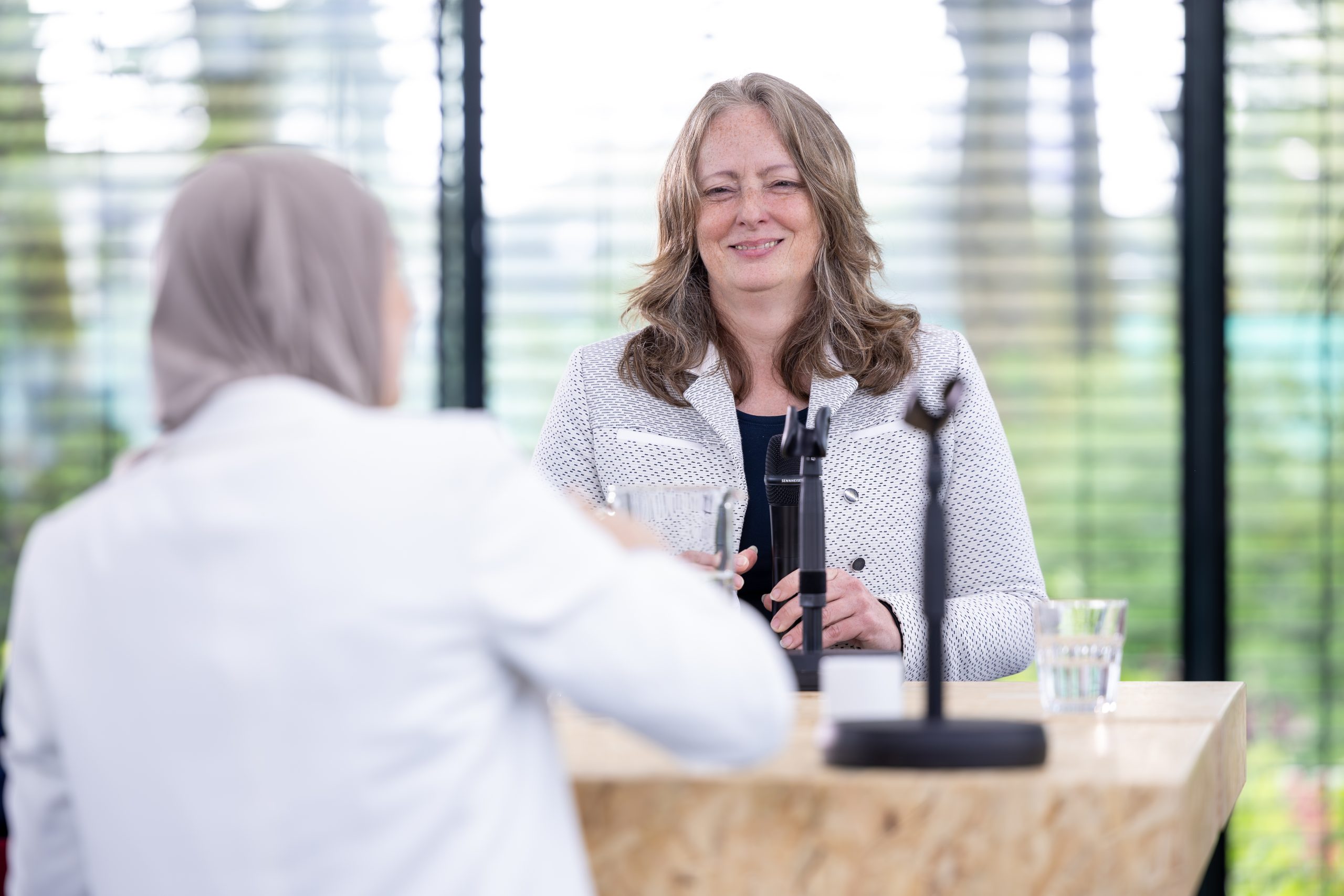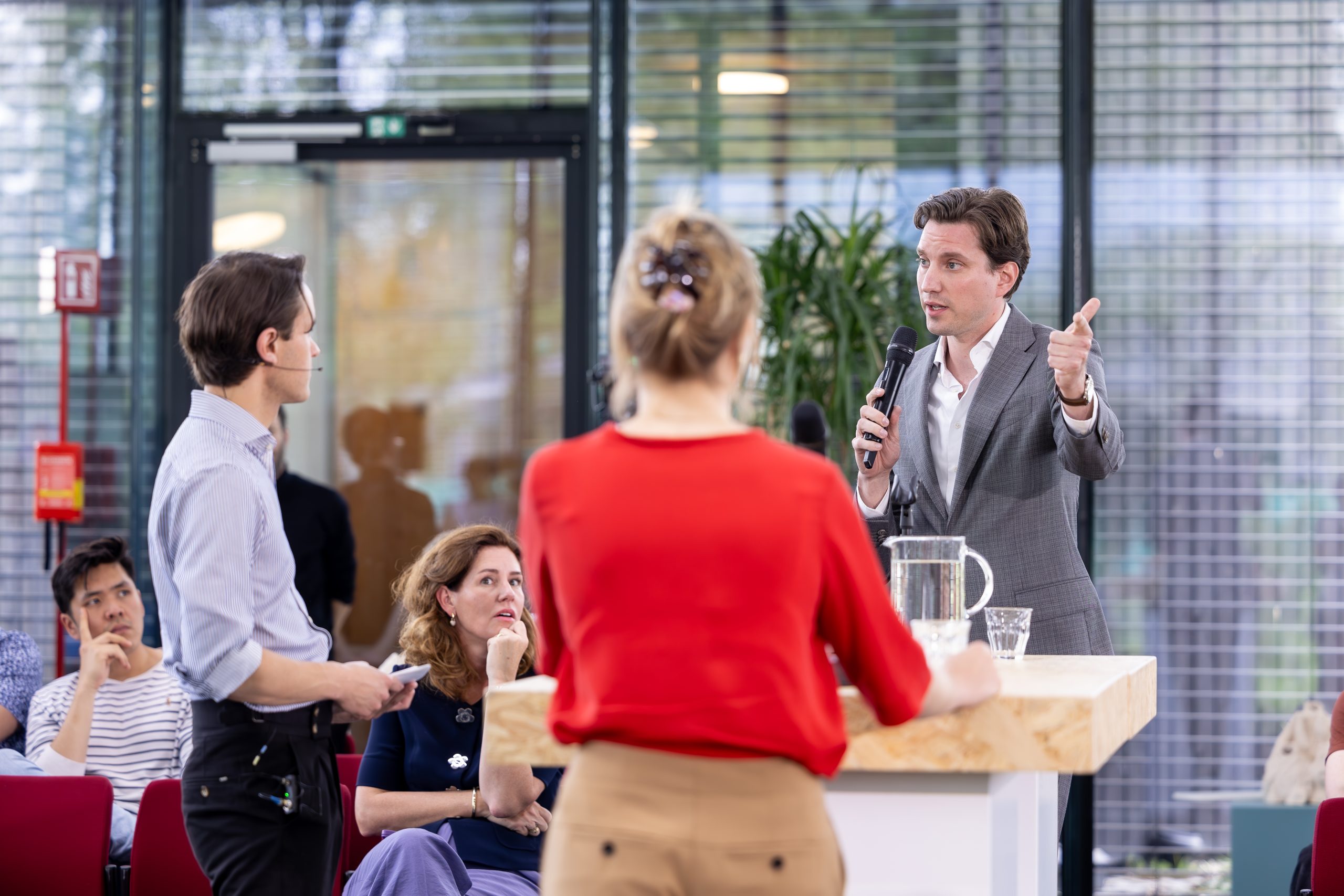In the elections debate organised by TU Delft, the new Coalition Agreement weighed heavily in the discussions on the energy transition. “The VVD says they want to use European money for innovations. How does that reconcile with their plans to give less money to Brussels?”
Led by moderator Dion Huidekooper (left), Michiel Hoogeveen (JA21) and Anna Strolenberg (Volt) debate the role of science and innovation in energy transition. (Photo: Robèrt Kroonen)
It only takes a few minutes before the term nuclear energy is dropped into the Energy Debate (in Dutch) at the Co-Creation Centre in The Green Village on Friday afternoon. This appeared to be the biggest divide between the experienced left parliamentarian Bas Eickhout (#1 on the PvdA-GL candidate list) and the two more right leaning newcomers Robbert van Eerd (#8, CDA) and Fabiènne Hendricks (#6, VVD).
In the run-up to the European Parliamentary elections on 6 June, TU Delft invited seven serving or aspiring parliamentarians for an energy debate. This debate on the energy transition is divided into three rounds with different debaters. Eickhout and Michiel Hoogeveen (#1, JA21) are already members of the European Parliament. The others – Van Eerd, Hendricks, Anna Strolenberg (#2, Volt), Laura Visser (#6, D66) and Jamilja van der Meulen (#10, NSC) – are aspiring members.
Nuclear energy
Hendricks says that nuclear energy is an ‘important way forward’ for the VVD. For the CDA too, becoming less dependent means having to use ‘nuclear energy, for example’, Van Eerd says, backing her up. He sketches an idyllic picture. “If it is windy in Denmark, we get energy from the wind. If it is wind still here, we get nuclear energy from France.”
Eickhout (PvdA-GL) sighs, saying that all that talk about nuclear energy is ‘a distraction by the right’. He says that the energy security postulated is better than its reality, and that nuclear power plants always more expensive than planned, and building them takes decades. “We need energy now.”
From the Fact Forum , Benjamin Sprecher, Industrial Ecologist (Assistant Professor, Industrial Design Engineering) adds his expert view. He stresses that ‘absolutely no one’ in his field sees nuclear power plants as a solution. “This does not mean it is a bad idea in the long term. But it makes no sense for the problems in the short term.”

Industrial politics
That more is needed than just a nuclear energy policy to make Europe energy independent, is something that all three parties in the debate agree with. And this is exemplified ‘horribly’ by Russia’s invasion of Ukraine which shows how dependent we are on raw materials such as those from Russia. All three believe that energy independence also involves ‘being honest’. “We will not be able to be independent in the short term,” says Hendricks. “The VVD wants to speed up the process in the long term, and think more about options such as jointly organising the buying of raw materials,” says the VVD politician.
The term ‘industrial politics’ is regularly dropped, often by Hendricks who used to work at Tata Steel. All three parties would like to use European money to enable industrial companies to become more sustainable. Nevertheless, Eickhout is not entirely convinced by the ideas of his VVD opponent, however much the latter says that the VVD wants to invest. “A European investment plan means more European money. But the Coalition Agreement mostly says that the Netherlands wants to give less money to Brussels. It reads like going back to the future.”
Ideological differences
The discussion that Anna Strolenberg, Volt’s number two, and Michiel Hoogeveen of JA21 engage in about financing and stimulating science and innovation clearly shows their ideological differences. Volt wants the EU to set up a venture capital fund in which investors can make money available to companies in the energy transition. The EU would be partly or entirely the guarantor.
Hoogeveen calls this “a communist back-up system”. In his eyes this is the umpteenth example of what makes the EU the “world’s champion in regulations”, which he believes would have a “stifling effect” on the economy.
JA21 pictures a “small, slimmed down EU” and while the party is not against the energy transition, Hoogeveen does not believe that the “earth has a thermostat which you can regulate”. The audience sighs when they hear this. He wants the transition to be bottom up, with no regulations from the EU. He believes that the market can do this.
It is again Industrial Ecologist Sprecher who offers clarity from the Fact Forum
For Volt, a strong European Union is the way forward. Strolenberg says that “It is worrying that extreme right wing parties that say that you cannot turn the knob are on the rise.” It is again Industrial Ecologist Sprecher who offers clarity from the Fact Forum. “It is the market that has put us in this situation. So the market needs to be managed.”
Coalition Agreement
Given that the PVV, BBB, VVD and NSC only presented their Coalition Agreement two days before the debate in The Green Village, the members of the governing parties are asked critical questions about its content. VVD party member Hendricks is asked about how her desired Europe-wide innovation plans match the plans of the national VVD to do away with research on raw materials and batteries in favour of lower fuel prices.
Eickhout adds to this question saying “The VVD wants to give less money to Brussels. But it still wants to innovate. How can this work?” “I could give a political answer,” says Hendricks, opting for a different tack. “There are sometimes things that I personally do not agree with.”
Laura Visser (D66) also regularly confronts her NSC opponent Jamilja van der Meulen about the Coalition Agreement that was partly written by NSC. Among the issues she raises is the lack of climate plans in the Agreement. Van der Meulen distances herself from it. “It causes me pain in my heart. But we are talking about Europe here. You cannot hold it against me that the Netherlands voted for the right.”

Support
Earlier in the debate, the D66 and NSC representatives had concluded that the energy transition has gone much too slowly recently. But while this is a reason to speed things up for D66, NSC sees this differently. Van der Meulen says that the NSC is concerned that speeding things up would undermine support. “It must remain doable. If not we will end up even further behind.”
Vissers’ reaction shows that this is a thorn in the side of D66. “If we do not keep the momentum going, my generation (Visser is 38 years old, Eds.) will pay the highest price.”
Van der Meulen (NSC) uses a lot of words to ‘not give a short answer’
When David Peck of the Fact Forum asks whether the debaters would vote for or against the Net-Zero Industry Act, Van der Meulen needs a lot of words to ‘not give a short answer’. Again to Visser’s indignation. “It is really shocking how much effort it takes to simply say yes to what is good for the Netherlands and for a liveable future.”
Forming an opinion
Has the debate in The Green Village helped the people in the audience form an opinion? Maarten (26, Electrical Engineering master’s student) mostly thought it was a shame that the debate was not concrete. “But they are politicians after all. They all want things to be better, but they are stuck in generalities. I do not feel taken seriously.”
Swing voter Sander (22, Applied Physics master’s student) says that he is in any case a little wiser. He was impressed by CDA’s Van Eerd who “did not give way when Eickhout drew on his charisma and bravura” in their debate. Whether Sander will vote for him or not will transpire on 6 June.



Comments are closed.